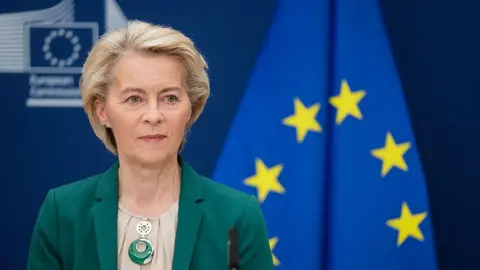The European Union (EU) has once again postponed its retaliatory trade tariffs targeted at the United States. This announcement was made by European Commission President Ursula von der Leyen. The countermeasures were initially scheduled to commence on Tuesday, serving as a direct response to the import taxes imposed by former President Donald Trump on steel and aluminum. These tariffs, set forth by the US, have triggered a tumultuous trade dialogue between the two major economic powers.
Originally planned to affect approximately €21 billion worth of US goods, the EU’s counter-actions had first been suspended earlier this year in March. The extension of this suspension has now been pushed until early August. Von der Leyen communicated this decision during a press conference, emphasizing the desire for extradition toward diplomatic negotiations before any punitive economic measures take effect. In the context of these developments, EU trade ministers are scheduled to convene in Brussels on Monday to strategize on how to effectively respond to the rising tensions with Washington.
The backdrop of this scenario involves correspondence from Trump to von der Leyen, where he announced intentions of imposing a hefty 30% tariff on EU imports, effective from August 1. The letter carried a stern warning: should the EU decide to retaliate, the US would reciprocate with even higher tariffs across the board, surpassing the proposed 30%. This tightening of trade grips comes amidst Trump’s assertions on Fox News, where he declared that significant amounts of revenue are being generated as a result of these tariffs, albeit many international partners were displeased with the developments.
During her press briefing, von der Leyen reinforced the EU’s stance on prioritizing dialogue over conflict. She noted, “The United States has sent us a letter with measures that would come into effect unless there is a negotiated solution, so we will therefore also extend the suspension of our countermeasures until early August. At the same time, we will continue to prepare for the countermeasures so we’re fully prepared.” Her statements reflected a common sentiment within the EU that diplomatic avenues should still be pursued vehemently.
The urgency behind these talks was echoed by Germany’s Finance Minister Lars Klingbeil, who advocated for urgent and solution-driven negotiations with the US. He affirmed that, should diplomatic avenues falter, the EU must resort to “decisive countermeasures” to safeguard its jobs and businesses. For Klingbeil, this was not just about tariffs; it was about the future stability of the economies within the EU bloc. Further supporting this perspective, French President Emmanuel Macron called upon the European Commission to “resolutely defend European interests” when dealing with the US, as negotiations loom precariously.
Within the larger context of Trump’s administration’s trade policies that have seen tariff propositions across 24 nations—including the EU, which itself is composed of 27 countries—there lies a broader agenda. Recently, White House trade adviser Peter Navarro outlined an ambitious goal to conclude “90 deals in 90 days,” although tangible progress on this front has largely been limited to two announced agreements with the United Kingdom and Vietnam.
As the situation evolves, the EU finds itself at a crucial crossroad. The potential economic fallout from escalating tariffs could pose significant risks. Yet, as reiterated by multiple officials, there resides within European leadership a strong commitment to diplomacy, expressing the hope that constructive discussions can yield a favorable resolution before further retaliatory measures become necessary. This saga not only defines current EU-US relations but speaks volumes about the complexities of global trade in an era characterized by shifting allegiances, economic protectionism, and national interests.








